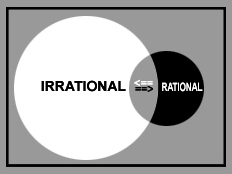Clearly, you have understood nothing at all.
It has exclusively to do with prejudice.
Your statement only confirms my previous assumption. Now the little boy is offended.
It is the bubble of pseudo-rationality that you are in. You really believe that all you have to do is keep the irrational far enough away from the rational and then you have your “solution”. Yes, the solution you are seeing right now: The irrational dominates you. That is your “solution”.
Again: You are not the first to constantly sanctify the rational and thus demonize the irrational and therefore not realize how irrational that is.
And again: You have understood absolutely nothing. You show that more and more clearly.
You falsely believe, by saying to “adhere to rationality”, that understanding is not a problem for you. In reality, this is exactly your biggest problem, as you show here more and more clearly. You are stuck in a trap, in the bubble of pseudo-rationality.
You run away from reality, always back into your bubble.
At the same time, you once said a really important sentence in a thread, but you yourself satirically dismissed it in this thread, as if you wanted to draw a caricature of yourself. I have taken this sentence to one of the occasions to open this thread. I did not know at that time how inflexible you are in thinking.
I wonder why you are even posting in this thread, because you obviously don’t like the topic of this thread.
I have stated what this thread is about. You want to make it your thread. Then go ahead and make a thread of your own. Good luck with that.
